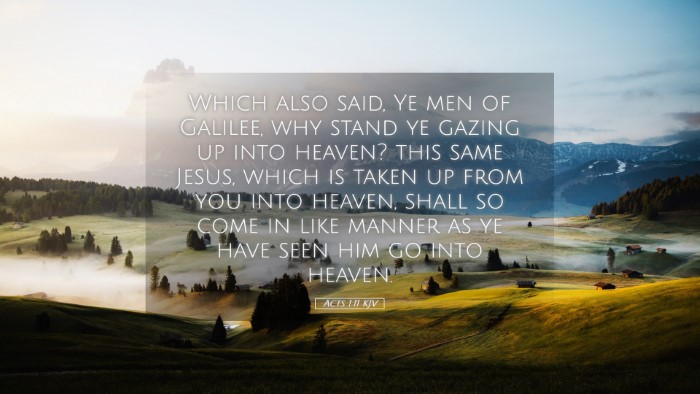Old Testament
Genesis Exodus Leviticus Numbers Deuteronomy Joshua Judges Ruth 1 Samuel 2 Samuel 1 Kings 2 Kings 1 Chronicles 2 Chronicles Ezra Nehemiah Esther Job Psalms Proverbs Ecclesiastes Song of Solomon Isaiah Jeremiah Lamentations Ezekiel Daniel Hosea Joel Amos Obadiah Jonah Micah Nahum Habakkuk Zephaniah Haggai Zechariah MalachiActs 1:11
Acts 1:11 KJV
Which also said, Ye men of Galilee, why stand ye gazing up into heaven? this same Jesus, which is taken up from you into heaven, shall so come in like manner as ye have seen him go into heaven.
Acts 1:11 Bible Commentary
Commentary on Acts 1:11
Verse: "Which also said, Ye men of Galilee, why stand ye gazing up into heaven? this same Jesus, which is taken up from you into heaven, shall so come in like manner as ye have seen him go into heaven."
Introduction
This verse captures a pivotal moment in Christian history—the ascension of Jesus Christ into heaven. It serves not only as a historical account but also as a profound theological statement regarding Christ's exaltation and the promise of His return. The angelic message delivered to the disciples serves as both a rebuke and encouragement, framing the disciples' understanding of their mission moving forward.
Examination of the Text
The angel refers to the disciples as "Ye men of Galilee," which is significant on multiple levels. First, it acknowledges their regional identity and cultural background, which is critical in understanding the early church's mission to reach the broader world. The phrase highlights their humble beginnings and the miraculous nature of their calling.
Why Stand Ye Gazing?
The question posed by the angels, "Why stand ye gazing up into heaven?" serves as both an admonition and a call to action. This reflects a common human tendency to remain passive in moments of spiritual revelation. Matthew Henry notes that the men were struck in awe, which is a natural response; yet, the angels gently redirect their focus from contemplation to mission. The directive forces them to engage with their immediate responsibility—the Great Commission.
Promise of His Return
When the angels declare that "this same Jesus" will return, it affirms the continuity of Christ's identity and mission. Albert Barnes emphasizes that the term "this same" highlights the physical, bodily resurrection, reassuring believers that the person who ascended is the same who walked with them and impacted their lives. This promise assures Christians not just of Jesus’ return, but of His authority and the certainty of His involvement in history.
Theological Implications
The ascension of Jesus holds deep theological significance. Adam Clarke points out that it is the climax of Christ's earthly ministry and a prelude to the outpouring of the Holy Spirit. The transition from Jesus' earthly ministry to the governance of His kingdom through the Spirit signifies the birth of the Church as a dynamic entity empowered for mission.
Encouragement for the Church
This verse serves as an encouragement for the Church. The certainty of Christ’s return should instill hope and motivate action. Matthew Henry asserts that the return of Christ is a foundational belief that influences how believers live their lives in expectation of His second coming. The disciples were entrusted with the Gospel, a duty that is passed to believers today; thus, the message compels ongoing faithful service.
Practical Application
- Engagement in the Mission: Believers should not be passive spectators but active participants in the Great Commission, empowered by the Holy Spirit.
- Living in Hope: The church is called to live in anticipation of Christ's return, which shapes ethics, priorities, and community life.
- Community of Witnesses: The collective memory of Christ’s ascension and promise of return fosters a community of witnesses, encouraging believers to share their faith boldly.
Conclusion
Acts 1:11 holds rich theological depth and practical significance for the church. As we reflect upon this verse, it reminds us that our gazing should lead to going, transforming our wonder into faithful work. The promise of Christ’s return assures us that our labors are not in vain but under the lordship of the one who will come again. Thus, we are called to live actively in anticipation, sharing the good news until He returns.


